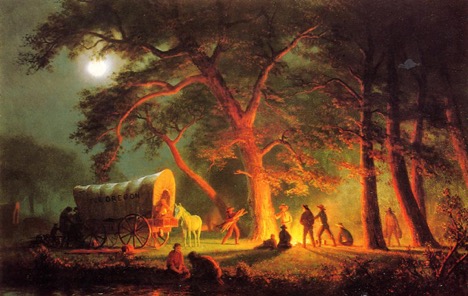Messy pluralism may now be the most Americans can attain.
No Creed Without Culture

And no culture without history.
The question of American national identity will be with us for a long time to come, so there will continue to be good reasons to revisit Samuel Huntington’s work repeatedly, along with subtle and respectful critiques of his work like this one from Charles Kesler.
Still, it seems to me that the questions facing us have shifted a great deal in the past fifteen years, in ways that have greatly strengthened certain aspects of Huntington’s position, particularly in comparison to those of his then-opposite, Francis Fukuyama.
In 2005, it was not yet as widely acknowledged as it is today that American efforts to transform the Middle East in the image of its own liberal democracy were unlikely ever to succeed, or that the belief in the universal applicability of our practices and institutional arrangements would lead to actions that were clumsily premature at best—and delusive at worst. But Huntington foresaw all this.
It was Huntington, too, who warned as the Cold War was ending that the ideological conflicts of the recent past were likely to be succeeded not by the establishment of a Kantian world government, but by deep civilizational conflicts. Such conflicts would place venerable creeds and cultures in opposition to one another, and push back against the post-Cold War West’s desire for a unified new world order fashioned in its own image, comprised of supranational organizations like the UN and the EU. He appears to have been largely prescient about that too, at least so far, as those organizations steadily weaken, and nation-states seek to regain their sovereignty and reassert their authority.
One of Huntington’s chief purposes behind Who Are We?, as I read it both then and now, was to urge Americans to begin thinking of their nation-state less as the exemplar and chief agent of a triumphal form of universal modernity, and more as a particular way of life. That is, to think of our nation as our home in a world full of nations and peoples that think and operate and live in quite different ways—ways that may in the end be incommensurable with American ways. If we were to preserve that precious American way of life, Huntington reasoned, we would need to acknowledge its distinctiveness, its preciousness, and find ways to protect it in the years ahead rather than imagine that it could or should take the entire world by storm.
That doesn’t mean that one should draw the conclusion that culture is everything. I agree with Kesler that any such recognition of culture cannot, for Americans, come at the expense of our creedal affirmations, or be upheld by culture alone, or even by culture primarily. Like Christians who steadfastly affirm the truth of their creed even in a pluralistic religious world, so we can uphold the truth of our creedal assertions, particularly our belief in intrinsic human dignity and imprescriptible rights, without resort to multiculturalist or relativist evasions.
But some of those affirmations are cultural in character or unintelligible apart from culture. One reason why the assimilation of immigrants is such an important issue is precisely because assimilated immigrants have demonstrably accepted an American culture—a culture of work, responsibility, stability, and law-abidingness, among other things—in which abstract words like “all men are created equal” and “life, liberty, and the pursuit of happiness” can have a tangible and concrete meaning.
I think Kesler says exactly this in his final two sentences: “The American creed is the keystone of American national identity; but it requires a culture to sustain it. The republican task is to recognize the creed’s primacy, the culture’s indispensability, and the challenge, which political wisdom alone can answer, to shape a people that can live up to its principles.” But he doesn’t say how today we are to maintain—or recreate?—the kind of culture that can sustain the American creed. The creed by itself cannot create it, and without the grounding of culture it can even sometimes turn against the culture, like an autoimmune disorder.
Let me explain. One of the chief ways that we can create and maintain a creed-sustaining culture—a way that all countries and peoples have successfully employed while they thrived—is by remembering and honoring our past. We honor especially those who came before us, and whose sacrifice and labor and suffering were integral to the making of our nation. We do not honor them because they were perfect, but because they were our forebears; and so this honoring cannot always be made to perfectly follow the dictates of the creed.
It was Burke who observed that “people will not look forward to posterity who never look backward to their ancestors.” But the creed can be turned against this kind of veneration, when it is deployed against, say, George Washington, for his ownership of slaves. In what way can the mania of historic statue-toppling that has recently swept across the country be said to be in opposition to the creed? Based on the creed alone, it is hard to argue against such purification of the public landscape. Washington, Jefferson, Woodrow Wilson…have they not all fallen short?
The creed is not fully adequate to explain why we should continue to venerate Washington as the father of our country. And yet the veneration of Washington is necessary to the health of the nation that upholds our creedal principles, and without that nation those principles would be little more than wistful aspirations.
Kesler rightly reminded us in his essay of the “we” that supports “these truths.” But it also needs to be said that there is something other than the support of “these truths,” something prior to them, that initially makes us a “we.” And it is to be found not merely in our culture, but also in our history—in what we remember and honor together.
The American Mind presents a range of perspectives. Views are writers’ own and do not necessarily represent those of The Claremont Institute.
The American Mind is a publication of the Claremont Institute, a non-profit 501(c)(3) organization, dedicated to restoring the principles of the American Founding to their rightful, preeminent authority in our national life. Interested in supporting our work? Gifts to the Claremont Institute are tax-deductible.
Conservatives must realize that in terms of creed and culture, we are past the point of no return. It's time for an offensive strategy.
America needs many voices to make good on its creed.
Statesmen and citizens alike must contend with the relationship between American creed and culture.




